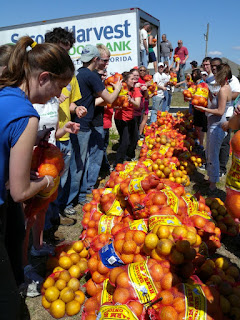Re-use your food and stretch your food budget
 |
| Volunteers load a truckload of oranges for local food banks and pantries. Learn how to donate at endhunger.org. |
This morning I sat for a few minutes and watched the Food Waste Ticker at EndHunger.org. The ticker showed that over 91 billion pounds of food have been wasted in the U.S. since the beginning of 2014. For every second that ticked by, I saw another 200 pounds of food being sent to our municipal landfills.
In February, 2014, the USDA released a report showing The Estimated Amount, Value, and Calories of Postharvest Food Losses at the Retail and Consumer Levels in the United States. The report shows that in 2010, the US produced 430 billion pounds of food. Of this available food supply, 31 percent went uneaten. Think about the impact of this unnecessary food waste.
- A total of 133 billion pounds of wasted food was sent to municipal waste facilities. Landfills collected over $2 billion from taxpayers and consumers to dispose of this food waste.
- If you purchased this 133 billion pounds of food from a grocery store, it would cost $161.6 billion.
- It's not just money that is wasted. This 133 billion pounds of food waste coverts to 141 trillion calories. That's enough food to supply each person in the US with 1,249 calories of energy per day.
What can you do to prevent food waste?
Start in your own kitchen. There are many ways to get the most value out of the groceries you buy.
- Look in your refrigerator before heading to the store for a quick dinner. Find ways to cook what you already have at home. The longer it sits in your pantry, the more likely it is that the food will go to waste.
- Plan your meals before you go shopping and make a shopping list. When you're at the grocery store, only buy those items on your list. Resist the urge to impulse buy.
- Don't buy more than you need. Buying in bulk only saves money if you are able to use the food before it spoils.
- Reuse food scraps. Fruit skins can be turned into pickles and jellies. Vegetable peelings make a tasty vegetable soup stock. Stale bread can be used to make croutons.
- Freeze, preserve, or can surplus fruits and vegetables. Fruits and vegetables are abundant during harvest season. Stock up on your favorites.
Our Favorite Food Saving Tips
Winter will be here soon and that means soup season is just around the corner. Around our house, there's always a quart of homemade vegetable soup stock in the freezer and a quart of vegetable peelings waiting to be cooked into stock. We save so much money when we Recycle Food Waste and Make Soup Stock.
When our favorite fruits are in season, we buy extra to freeze. Frozen fruits are are perfect for smoothies and ice creams. On the FoodFAQs blog, Regg and I share directions for how we freeze fruits without adding any extra sugar.
End Food Waste and Stop Hunger
Do you have food to spare? Not everyone is so fortunate. In 2012, 15.9 million children lived in food insecure households, homes where there is not enough nutritious foods for those children to grow up strong and healthy. Donate your excess food to your Local Food Bank.
Please help put an end to food waste.
Posted by Coletta Teske
Note: The author may receive a commission from purchases made using links found in this article. “As an Amazon Associate, Ebay (EPN), Esty (Awin), and/or Zazzle Affiliate, I (we) earn from qualifying purchases.”



























Really great tips! I was especially interested in the Watermelon Rind Pickles since I have always thought it was such a huge waste to throw away the rinds, but they are all really awesome recipes.
ReplyDeleteThanks for all the great tips. I am always wondering about how to freeze fruit...thanks for providing the link.
ReplyDeleteAmazing to see how peels and rinds and leftover 'bits' can be used to create a tasty dish and extend your food budget.
ReplyDeleteI have not made watermelon rind pickles in years so thanks so much for the link to that recipe! And thank you for sharing my Paella recipe!
ReplyDeleteFood waste awareness is so important and I'm delighted you share great tips for reducing the waste, as well as the statistics, which are disheartening to the hungry, for sure.
Terrific article with great tips - and the stats are mind boggling. We're trying to be careful ourselves about waste and I have to agree with soups and most of all I hate buying in bulk unless I know we need items in bulk. I find bulk buying can be the biggest waste of all.
ReplyDeleteLove the concept of 'Waste Not, Want Not'! This post is a great reminder of the importance of reducing waste and finding creative ways to reuse everyday items. Inspiring and practical advice!
ReplyDelete